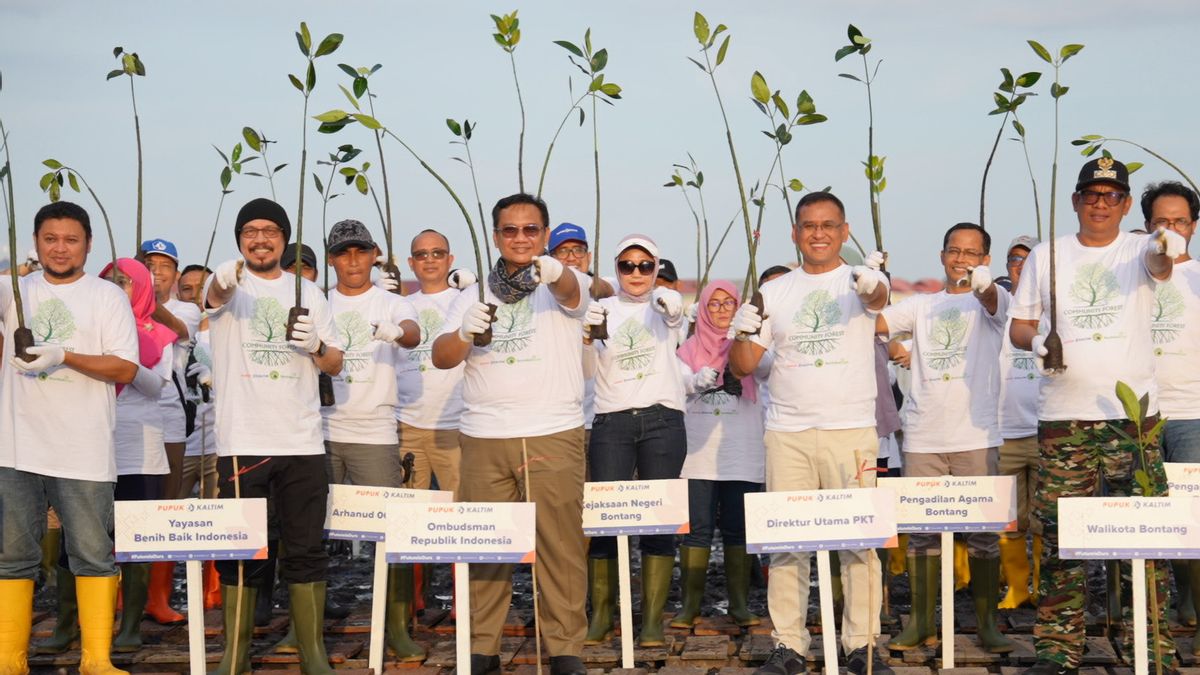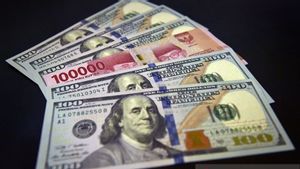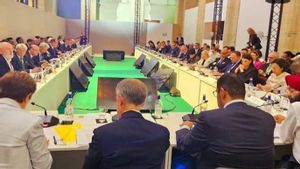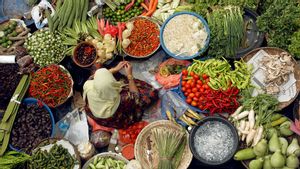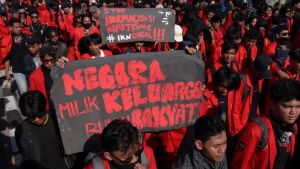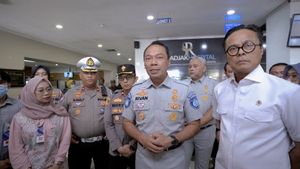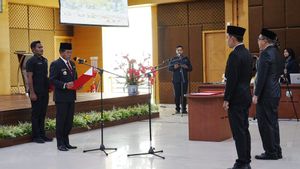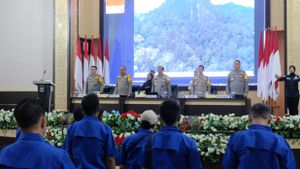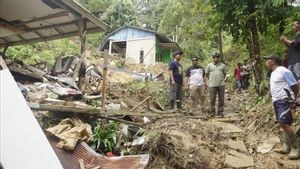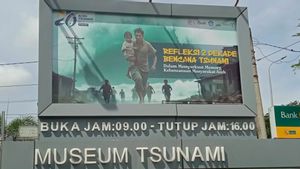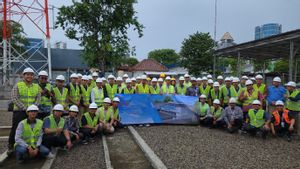JAKARTA - Increase commitment to encourage decarbonization through the expansion of the Community Forest program, PT Pupuk Kalimantan Timur (Pupuk Kaltim) in collaboration with Kutai National Park (TNK) and the Indonesian Good Seed Foundation (behihk.com), planting 500 thousand mangrove seeds focused in Eastern Indonesia. This activity was marked by simultaneous planting in the East Kalimantan Pupuk conservation area in Telok Bangko, Loktuan Village, Bontang City, Sunday, July 23.
President Director of Pupuk Kaltim Rahmad Pribadi, said that Community Forest is part of Pupuk Kaltim's commitment to implementing the principles of Environment, Social and Governance (ESG), by prioritizing aspects of environmental improvement to community empowerment, in order to achieve the target of decarbonization and net zero emissions through sustainable program initiation.
Community Forest is also an active step to increase its contribution to environmental conservation, with a target of 10 million trees by 2030. This initiation has been running for the past year, collaborating with a number of parties such as the Regional Government to the TNI to plant various types of tree seedlings in Indonesia.
"From the target of 10 million trees to be planted by 2030, 6 million of them are mangrove seeds with distributions in various parts of eastern Indonesia," said Rahmad Pribadi, in his statement, Tuesday, July 25.
Especially for the 500 thousand mangrove seeds that were realized this time, 300 thousand of them will be planted on the coast of Bontang City according to the area determined by the TNK Center, and 100 thousand seeds in the Pupuk Kaltim conservation area in the Bangko Telok area. Meanwhile, for collaboration with the Good Seeds of Indonesia, Pupuk Kaltim not only planted mangrove seeds, but also sweet fragrant mangoes with a total realization of 110 thousand seeds spread across the provinces of NTT and West Papua.
"For mangroves, 25 thousand seeds will be planted in Lembata and Alor NTT, as well as 50 thousand seeds in Sorong, West Papua. Meanwhile, for mango trees, 10 thousand seeds are planted in Kupang, NTT," continued Rahmad.
Rahmad explained, the expansion of the mangrove Community Forest is targeted to reach 1 million trees in one year, so that the realization of 6 million seeds can be achieved with the continuity of planting until 2030. And from this planting, Pupuk Kaltim also targets carbon offsets of between 50 - 200 thousand tons of CO2 per year, in accordance with the decarbonization roadmap run by the company.
Where Community Forest is one of the first phase of decarbonization programs focused on Pupuk Kaltim in carbon offset, with a target of 600,000 tons of CO2 per year by 2030. Meanwhile, in the second phase, Pupuk Kaltim will focus its realization on low carbon source and carbon capture storage, as a continuation of corporate steps in creating a greener and carbon-free business climate.
"So at least one million mangrove seeds will be planted Pupuk Kaltim every year, with distributions in various parts of Indonesia. Likewise for other types of tree seedlings, they will continue to be intensified by increasing the realization to encourage carbon offsets according to the expected target," added Rahmad.
Indonesian Good Seed Founder Andy F Noya, said community forest is a shared momentum in encouraging environmental improvement and suppressing carbon emissions, in addition to efforts to increase contributions to the community's economy through empowerment.
"This is important to carry out continuously, considering the benefits generated are not only for the environment but also for the community from an economic and empowerment perspective," said Andy.
Andy F Noya also considered community forest to be concrete evidence of Pupuk Kaltim in supporting equity, not only in terms of development but also efforts to improve the environment to improve the community's economy. This sees that the realization carried out by Pupuk Kaltim is not only focused on the western part, but also on the eastern region of Indonesia.
Like in Bontang City, where people get economic benefits from nurseries and management of mangrove seeds in the Pupuk Kaltim conservation area, and are able to create economic opportunities from derivative products such as making dumplings to foods made from mangroves.
In addition, the aspect of empowerment indirectly also involves the community in maintaining trees planted for benefit continuity. Moreover, if the area is developed into a tourist destination, it will further increase the value of carbon emission compensation from managed programs.
"Seeing the realization carried out, community forest can be an affirmation of Pupuk Kaltim's commitment to continue to increase its contribution to the environment and society. If this continues to be encouraged, we are sure that the value of benefits will be felt evenly by the people in Indonesia," Andy explained.
Head of the TNK Persada Center, Agus Setia Sitepu, revealed that mangrove planting through community forest shows a high commitment to Pupuk Kaltim to encourage decarbonization, in accordance with the government's efforts to suppress carbon emissions. For this reason, his party also welcomes the optimism of collaboration between TNK and Pupuk Kaltim, which in the future is expected to be further developed for ecosystem sustainability, especially in the Kutai National Park conservation area.
另请阅读:
"Balai TNK is very supportive of the community forest program Pupuk Kaltim, through collaboration for a better earth. By participating in planting mangroves, it shows the company's strong commitment to maintaining the ecosystem, as well as a form of positive contribution to the environment and region," said Persada.
The Mayor of Bontang Basri Rase also appreciated the community forest support initiated by Pupuk Kaltim for environmental improvement, while still paying attention to the empowerment aspect for the community. According to him, this time, mangrove planting is a form of Pupuk Kaltim's commitment to assist the Government in regional conservation, where Bontang City with 70 percent of waters requires the existence of a mangrove ecosystem for abrasion prevention, in addition to its function as carbon dioxide absorber.
"In addition, the community also benefits from empowering mangrove management to be able to create various products that have economic value and have an impact on welfare," said Basri Rase.
The English, Chinese, Japanese, Arabic, and French versions are automatically generated by the AI. So there may still be inaccuracies in translating, please always see Indonesian as our main language. (system supported by DigitalSiber.id)
